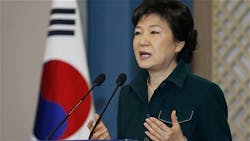South Korea Investing $3.7 Billion to Rebalance Economy
SEOUL -- South Korean President Park Geun-Hye unveiled Tuesday a three-year plan to rebalance the export-reliant economy, investing $3.7 billion on start-ups, boosting domestic spending and getting more young people and women in the workforce.
Park said the plan -- announced on the day she completed her first year in office -- would deliver a potential economic growth rate of at least 4% by 2017.
"Our past... way of growth that made us one of the world's 10 largest economies has now reached its limit," Park said in a national televised speech.
Asia's fourth-largest economy faces a widening imbalance with the export and manufacturing sector -- led by all-powerful conglomerates -- totally overshadowing the domestic consumer market and services industry, she said.
She also highlighted the dangers posed by what she described as South Korea's "silent, looming disaster" -- its rapidly ageing population that threatens to slash the workforce and impose a heavy welfare cost.
"Unless we change the fundamentals of the economy and break from the trap of slow growth, there will be no future for us," Park warned.
The national economy grew 2.7% in 2013.
According to the three-year plan, the government will spend four trillion won (US$3.7 billion) by 2017 to help small start-ups and increase spending on research and development to the equivalent of five percent of the GDP, from the current 4%t.
It will also ease an array of regulations on five key service industries -- healthcare, education, finance, tourism and software.
In a bid to spur domestic spending, the plan also aims to build more new homes and offer low-interest loans for South Korean families desperate to enter the property market.
South Koreans' household debt -- mostly housing loans -- amounts to nearly 140% of their disposable income on average -- one of the highest rates in the world.
"Solving the issue of housing debt... is the first priority to spur consumer spending," Park said, promising to reduce the debt ratio by five percentage points by 2017.
While opinion polls have shown a healthy approval rating for Park after hew first year in office, she scores far higher marks for her foreign policy than her handling of the economy. A series of surveys commissioned by leading newspapers have shown disapproval of her economic policy running at around 50%. One of the largest-circulation dailies, the Dong-A Ilbo, compared her economic team to "a student who is full of motivation but knows little about how to study and ends up being an underachiever".
Park, South Korea's first woman president, came to office vowing more gender equality and her speech on Tuesday offered more childcare services for working mothers and incentives for companies that hire more women and young people.
"All aspects of our economy, including domestic spending and exports, manufacturing and services, big conglomerates and small and medium firms and the capital city and the rest of the country, should show balanced growth so that all South Koreans will be able to enjoy fruits of growth," Park said.
The president's plan aims to improve the national employment rate to 70% by 2017 from the current rate of around 60%.
Park also vowed to reform debt-ridden state-run firms long criticized for poor management, corruption and over-generous benefits for workers.
"Such long-running problems should no longer hamper our economic growth," Park said, warning of heavier punishment for corruption and tighter requirements on state-run firms' financial health.
-Jung Ha-Won, AFP
Copyright Agence France-Presse, 2014
About the Author
Agence France-Presse
Copyright Agence France-Presse, 2002-2025. AFP text, photos, graphics and logos shall not be reproduced, published, broadcast, rewritten for broadcast or publication or redistributed directly or indirectly in any medium. AFP shall not be held liable for any delays, inaccuracies, errors or omissions in any AFP content, or for any actions taken in consequence.
